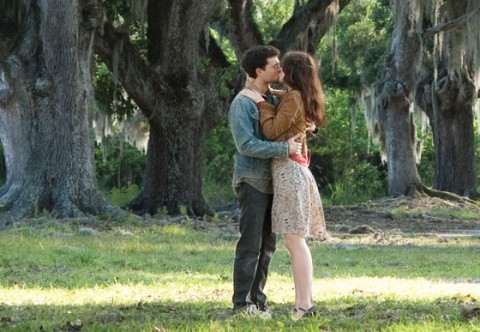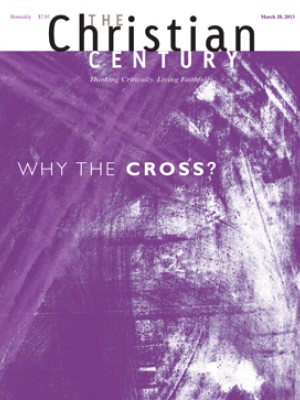Supernatural romance

The film Beautiful Creatures, based on a young adult novel by Margaret Stohl and Kami Garcia, opened in theaters on Valentine’s Day, staking its claim as the supernatural romance of the post-Twilight era. It’s the story of a mortal boy, Ethan Wate (Alden Ehrenreich), and a girl who is a caster (or witch), Lena Duchannes (Alice Englert), whose love is doomed by an ancient curse that forbids pairings between mortals and casters. To complicate matters, Lena is approaching her 16th birthday, when her nascent powers will reach full bloom and be claimed for dark or light. Presumably, she has no choice in her “claiming.” Her hidden “true nature”—in the book it’s like a magic toss of the coin—will decide for her. Lena’s own mother, Sarafine (Emma Thompson, committed to her role with almost delirious delight), “went dark” and is on a mission to take Lena with her.
Like most teenagers caught in a situation they cannot control, Lena sulks; she also writes broody poetry in a tattered journal. Falling for Ethan upends this passivity. It is Ethan’s stubborn, human insistence that Lena can control her own destiny, or at least change her fate, that supplies the title to the film and the book. Lena’s uncle says to Ethan: “Mortals. I envy you. You think you can change things. Stop the universe. Undo what was done long before you came along. You are such beautiful creatures.”
Read our latest issue or browse back issues.
As far as paranormal teenage romance goes, this plot is standard. What better way to give voice to the turmoil of adolescence than to paint it in terms of supernatural, life-or-death battles between good and evil? When you are 16, figuring out if young love is real can feel like a life or death matter.
Similar themes appear in The Vampire Diaries, a soap opera on the CW TV network about teenage vampires, werewolves, witches and dopplegängers, now in its fourth season. In that series, the quest to prove that a newly turned vampire really does love her maker—and is not just compelled to love him—might literally cause the end of the world. Countless song lyrics bear witness to the desire to be “real” in a world that feels fake and manufactured. In the film Warm Bodies, a zombie-meets-girl romance, that same worry is externalized in a zombie apocalypse, the cure for which is genuine human connection.
Again and again, Ethan encourages Lena to “claim herself.” Only then, presumably, will she be free to claim him. As Lena moves closer to Ethan’s human world, Beautiful Creatures might have presented just one more optimistic message to teens: Own your own destiny! Be your own person!
When Lena does claim herself, however, the result does not fit Ethan’s teenage fantasies. Her most powerful act of agency is to give Ethan up in order to secure his safety and resist the dark powers. Choosing a fate that, in the world of adolescent love, is worse than death, she casts a spell on him so that he forgets he ever knew her.
This act of sacrifice works only because Lena and Ethan’s story is not entirely their own. The curse that thwarts their love is part of a long history involving betrayed lovers, Civil War deserters, town secrets, family heirlooms and honored promises. To break the curse, Lena has to accept her role in this history. She has to allow competing claims of love—from Ethan, her uncle, even the twisted love of her mother—to influence her decisions.
The history that is supposed to hold the lovers in a web of human and supernatural connections owes more to the History Channel than history books. But the film taps into an unexpected understanding of agency: Lena finds her power within the ties that bind, not in trying to unbind them.
Since this is a love story, she gets Ethan back, of course. But despite the story’s refrain of “Claim yourself,” these young adults turn out to be already claimed—by histories and communities and bonds of love and commitment that they only begin to understand. They have to embrace the history that claims them in order to claim the power to live and love.






